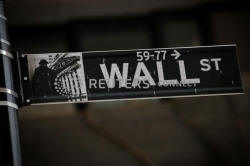Wall Street finds blockchain hard to tame after early euphoria
 Send a link to a friend
Send a link to a friend
 [July 16, 2019] By
Anna Irrera and John McCrank [July 16, 2019] By
Anna Irrera and John McCrank
NEW YORK (Reuters) - Two years ago Nasdaq
Inc and Citigroup Inc announced a new blockchain system they said would
make payments of private securities transactions more efficient. Nasdaq
Chief Executive Adena Friedman called it "a milestone in the global
financial sector."
But the companies did not move forward with the project, a person
familiar with it said, because while it worked in testing, the cost to
fully adopt it outweighed the benefits.
Blockchain, the person added, "is a shiny mirage" and its wide-scale
adoption may still "take a while."
In a joint statement, the companies said the pilot was successful and
they were "happy to partner" on other initiatives. Both companies are
also working on other projects.
Companies, including banks, large retailers and technology vendors, are
investing billions of dollars to find uses for blockchain, a digital
ledger used by cryptocurrencies like bitcoin. Just last month, Facebook
Inc revealed plans for a virtual currency and a blockchain-based payment
system.
But a review of 33 projects involving large companies announced over the
past four years and interviews with more than a dozen executives
involved with them show the technology has yet to deliver on its
promise.

At least a dozen of these projects, which involve major banks, exchanges
and technology firms, have not gone beyond the testing phase, the review
shows. Those that have made it past that stage are yet to see extensive
usage.
Regulatory hurdles have often slowed down implementation, some
executives said. Scrutiny is likely to only increase after Facebook's
plans drew global backlash from regulators and politicians. (For a
sample of these projects, click on)
The euphoria that surrounded the early days of Wall Street's interest in
blockchain is giving way to pragmatism, as companies realize that it
will likely take years before it takes off in a substantial way.
"This is a transformation of the market. It isn't a big bang," said
Hyder Jaffrey, head of strategic investments for UBS AG's investment
bank.
It could take three-to-seven years before major projects have
significant impact, he said.
One UBS-backed project, a digital cash system for financial transactions
called Utility Settlement Coin, is expected to be commercialized next
year after more than five years of work, said Rhomaios Ram, head of a
separate entity created for the project.
But Ram said that for the system to be transformational, it will require
other market processes to move to blockchain-based systems as well.
"There is a recognition now that it is a journey, rather than something
with a short time frame," Ram said.
BLOCKCHAIN'S PROMISE
Blockchain was created about a decade ago as a way to keep track of
bitcoin transactions. As cryptocurrencies became more mainstream
following a 2013 rally and crash in bitcoin's price, consultants,
analysts and other proponents said their underlying technology could be
transformational, especially for the financial industry.
It could help trades settle instantly, accelerate international payments
and remove the need for costly intermediaries, potentially saving the
industry tens of billions of dollars, they said.
[to top of second column] |

A Wall St. street sign is seen near the New York Stock Exchange
(NYSE) in New York City, U.S., March 7, 2019. REUTERS/Brendan
McDermid

Investment followed. Last year the capital markets and banking sectors allocated
$1.7 billion on blockchain initiatives, up 70% from 2016, according to estimates
by research and advisory firm Greenwich Associates.
By 2022, blockchain investment across industries is expected to reach $12.4
billion, according to research firm IDC. (For a graphic about blockchain in
capital markets, click on https://tmsnrt.rs/2JxuQgl)
Some big companies have rushed in. International Business Machines Corp has
around 1,500 people working on the new technology for use in several different
sectors. In an ad released during the Academy Awards this year it called for the
use of blockchain "to help reduce poverty".
A system IBM was developing along with the London Stock Exchange Group Plc to
issue private shares did not move beyond testing, the companies said. But a
trade finance platform developed by numerous banks along with IBM has been
commercialized.
"I certainly think there has been a share of hype associated with blockchain,"
said Marie Wieck, a general manager at IBM.
BUSINESS BENEFITS
But Wieck and other industry executives said they remain bullish about the
prospect of the technology and their companies continue to invest in it. "To me
the business benefits of blockchain are clear," Wieck said.
John Whelan, Banco Santander SA's head of digital investment banking, said
blockchain projects need to work on three areas at the same time: technology,
demand and compliance.
"Those of us who were involved in blockchain early on maybe did not appreciate
the extent to which the three parts have to move together," Whelan said.
Santander is involved in numerous blockchain projects, including the Utility
Settlement Coin.
Around the time the project with Citi was announced in 2017, Nasdaq also started
testing a proxy voting system in Estonia that automates a manual and lengthy
process.
Lars Ottersgard, Nasdaq's head of market technology, said demand has been
limited for the product.
"To be honest, the value differentiation using blockchain from using traditional
technology has not been obvious," he said.

A Nasdaq spokesman said the exchange operator has since developed the system
further with South Africa's central securities depository, which plans to launch
it later this year.
(For a graphic on 'Blockchain in capital markets' click https://tmsnrt.rs/2JxuQgl)
(Reporting by Anna Irrera and John McCrank. Additional reporting by Suzanne
Barlyn in New York and Paulina Duran in Sydney.; Editing by Lauren Tara LaCapra
and Paritosh Bansal)
[© 2019 Thomson Reuters. All rights
reserved.] Copyright 2019 Reuters. All rights reserved. This material may not be published,
broadcast, rewritten or redistributed.
Thompson Reuters is solely responsible for this content. |